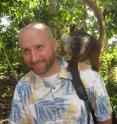Syracuse University scientist to speak on evolution and Islam at AAAS Annual Meeting
Fierce debate over teaching evolution in public schools has raged across the United States since the epic courtroom battle between William Jennings Bryan and Clarence Darrow during the 1925 Scopes Monkey Trial (State of Tennessee v. John Scopes). Science education researchers are now turning their attention to the Islamic world to determine whether teaching of evolution in schools spawns similar social controversy and what that means for the future of scientific thought across the globe. Jason Wiles, assistant professor of biology in Syracuse University's College of Arts and Sciences, will present "Teaching and Learning about Biological Evolution in the Muslim World," on Friday, Feb. 18 during the 2011 Annual Meeting of the American Association for the Advancement of Science in Washington, D.C. (Feb. 17-21). Wiles is also associate director of the Evolution Education Research Center at McGill University, Montreal.
Wiles will present preliminary results from a four-year study of five, predominately Muslim countries regarding Islamic understandings of evolution and attitudes toward teaching the subject. The study includes surveys of teachers, university professors, and high-school students in Indonesia, Pakistan, Egypt, Lebanon, and Turkey, as well as Muslim populations in Canada. Funded by the Social Sciences and Humanities Research Council of Canada, the study was conducted by Wiles, Brian Alters and Anila Asghar of McGill University, and Saouma BouJaoude of the American University of Beirut. The researchers plan to expand the study to six more Muslim countries and to Muslim populations in the United States.
"One of the most interesting findings when talking about Islam and evolution is that there isn't only one Muslim way of thinking about evolution," Wiles says. "Thoughts about evolution in the Muslim world are just as diverse as you would expect to find in the Western world. The teaching of evolution will vary greatly by country and cultural attitudes within the country."
Source: Syracuse University
Articles on the same topic
- Tip sheet: Caltech researchers presenting at AAASSat, 19 Feb 2011, 23:02:05 UTC
Other sources
- News briefs from 2011 AAAS meetingfrom Sciencenews.orgFri, 25 Feb 2011, 22:20:13 UTC
- 2011 AAAS meeting: Science without bordersfrom Sciencenews.orgThu, 24 Feb 2011, 16:10:09 UTC
- News briefs from 2011 AAAS meeetingfrom Sciencenews.orgThu, 24 Feb 2011, 15:50:20 UTC
- AAAS news briefs from UC Davisfrom Science BlogMon, 21 Feb 2011, 16:30:34 UTC
- Tip sheet: Caltech researchers presenting at AAASfrom Science BlogSat, 19 Feb 2011, 23:00:20 UTC
